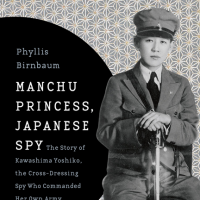Yoshiko Kawashima's life has been the subject of novels, soap operas and movies since the 1920s.
Manchu Princess, Japanese Spy, by Phyllis Birnbaum
272 pages.
Columbia University Press, Nonfiction.
This Manchu Qing princess was sent to Japan after the 1911 revolution to be raised by Naniwa Kawashima, a friend of her father and a controversial Nationalist figure. Determined to restore her family to the Chinese throne, she set out to become a "Manchu Joan of Arc," continually shifting loyalties. She cut her hair short, dressed as a man and broke countless taboos, shocking and delighting the press.
Her colorful story is intricately linked with Japan's misadventures in Manchuria. Transforming into "Commander Jin" and leading her own army, she was credited by the Japanese media with numerous feats of derring-do. In 1948, she was executed in Beijing as a spy.
Phyllis Birnbaum's book attempts to cut through the myths surrounding Kawashima, and is an excellent overview of her life. However, Birnbaum has little time for speculation and refuses to commit without evidence — a trait admirable in a historian but one that can cause frustration when myth is so central to the story. Understanding the mind of a subject requires a certain amount of imaginative leaping but Birnbaum's line keeps Kawashima as a distant figure, with the holes in the story left intact. This is particularly striking in the early chapters where important sections of her youth are skimmed over: A suicide attempt is dealt with in a sentence and explanations for her desire to be a "third gender" are only hinted at. The pace picks up when recounting the latter half of her life because better sources exist.
Kawashima was irrepressible and so is her story, refusing to conform to a conventional biography.


















With your current subscription plan you can comment on stories. However, before writing your first comment, please create a display name in the Profile section of your subscriber account page.